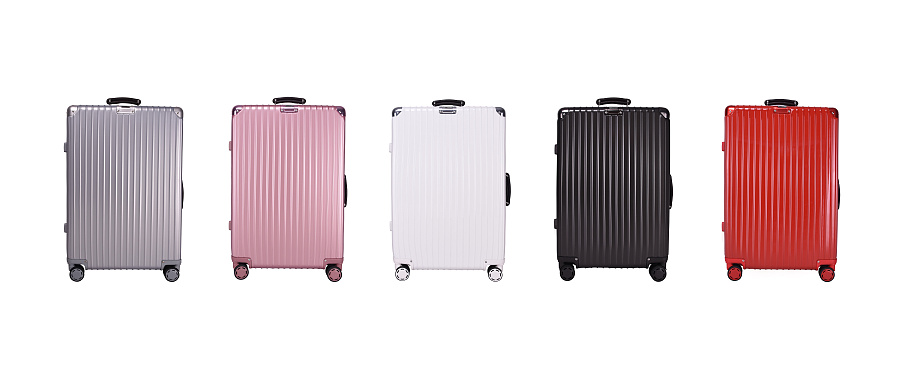(单词翻译:单击)
听力文本
This is Scientific American — 60-Second Science. I'm Christopher Intagliata.
If you've ever pulled a rolling suitcase through the airport, chances are you've also been annoyed by this common occurrence: the suitcase starts rocking back and forth on each wheel and finally tips over.
"It's a very classic phenomenon in physics." Sylvain Courrech du Pont, a physicist at the University of Paris Diderot. "So if you perturb the system it goes very easily unstable. This is shared by many, many phenomena in nature."
Courrech du Pont and his students wanted to get to the bottom of why luggage tips. So they built what looks like the skeleton of a wheeled suitcase, and then filmed it rolling on a treadmill. Then they modeled what they saw mathematically.
And here's what they found. Under normal rolling conditions, the forward motion of the suitcase is perpendicular to the wheels' axis of rotation. All good. But when you hit a bump or jerk the handle, one wheel lifts up. All of a sudden the pulling motion is no longer perpendicular to the still-rolling wheel's rotation, and the wheel corrects that by drifting towards the center. But by that time the other wheel's coming down, same thing happens, and now the suitcase is really rocking.

"And the first reaction you will have maybe is to slow down. But actually if you slow down you'll experience very big rocking oscillations." The way back to a smooth ride, he says, is to keep up your speed, or move even faster, once rocking begins. The study is in the Proceedings of the Royal Society A.
There are other solutions to suitcase instability—like doing a better packing job. "If you put heavy stuff close to the axis of symmetry, or close to the wheel axis, then it's stable, too."
And Courrech du Pont has one more piece of advice to avoid rocking in the first place: "If you go slow enough it will always be stable." Keep that in mind, next time you're running to your gate.
Thanks for listening for Scientific American — 60-Second Science Science. I'm Christopher Intagliata.
参考译文
这里是科学美国人——60秒科学。我是克里斯托弗·因塔利亚塔。
如果你曾拉着行李箱走过机场,那你很有可能也被这种经常发生的情况困扰过:行李箱的轮子开始来回摇晃,最后翻倒。
“这是一个非常经典的物理现象。”巴黎狄德罗大学的物理学家西尔万·科雷奇·杜邦说道。“如果你扰乱了系统,它就很可能变得不稳定。这是许多自然现象所共有的特点。”
科雷奇·杜邦和他的学生想弄清行李箱翻倒的真相。因此,他们制造了一个看上去像滚轮行李箱框架的东西,然后拍摄它在跑步机上的运动情况。之后他们把看到的情况建立了数学模型。
以下是他们的发现。在正常滚动的情况下,行李箱的前进运动与轮子的转动轴垂直。一切正常。但是当箱子碰到凸起处,或是你猛拉箱子把手时,一只轮子就会抬起。突然间,拉力运动不再垂直于仍在转动的另一只轮子的转动轴。而轮子会通过向中心位置滚动来修正方向。但这时,那只抬起的轮子会落到地上,然后同样的事情会再次发生,所以箱子开始更厉害地晃动。
“你的第一反应可能是减慢拉箱子的速度。但如果你慢下来,箱子会更剧烈地震荡。”他说,箱子开始摇晃以后,恢复平稳状态的方法是保持甚至加快拉箱子的速度。这项研究结果发表在《英国皇家学会学报A》上。
还有其他保持行李箱平稳的方法,比如更科学的打包方法。“如果你把重物放在箱子对称轴或轮轴附近,那行李箱也会稳定。”
科雷奇·杜邦还有一个可以从一开始就避免箱子晃动的建议:“如果你走得够慢,箱子就会一直保持平稳。”下次你奔向登机口时,不防记住这一点。
谢谢大家收听科学美国人——60秒科学。我是克里斯托弗·因塔利亚塔。
译文为可可英语翻译,未经授权请勿转载!
重点讲解
重点讲解:
1. get to the bottom of 找到…的真正起因;查寻到…的根;
例句:She got suspicious and decided to get to the bottom of it.
她起了疑惑,便决定弄个水落石出。
2. all of a sudden 突然地;出乎意料地;
例句:All of a sudden there was a terrific bang and a flash of smoke.
突然传来惊天动地一声响,还冒出一股烟。
3. keep up 保持;
例句:There will be a major incentive among TV channels to keep standards up.
将会有重大举措鼓励各电视频道维持高标准。
4. in the first place 起初;一开始;
例句:It was a shooting star that propelled me into astronomy in the first place.
最初是一颗流星促使我从事天文学。


